Santi & Tuğçe Interview w/Eigengrau
Published At
Wed, 6 Dec
Author
Interview: Güliz Karaköse

We met with Santi & Tuğçe at Ankara Cocktail Festival to talk about their music journey.
Todays guests of the Eigengrau Interview Series are Santi & Tuğçe.
Welcome!
Santi: Thank you!
Is it your first visit to Ankara?
Tuğçe: Actually it is my second visit. I came here as a kid with the scholl trip to visit Anıtkabir. This is our first visit together to have a concert.
How did Santi & Tuğçe initiate such a unique music journey?
Santi: We met when we were studying at the university in the States. We were neighbours. One of the first things I asked Tuğçe was... I don't remember, how did you tell me you were singing?
Tuğçe: A friend introduced us because we were both interested in Jazz.
Santi: So, somehow, Tuğçe told me that she sings. And then, the next week, we went to an open mic.
Tuğçe: Yeah, we went went somewhere called Jazz house to an open mic. And then we were performing more classical repertoire at first. But Santi was studying music at that time, music composition. Then we started adding more of the original songs to our repertoire. Eventually, we combined it with electrical instruments.
Santi: For many years, we were doing acoustic music with guitar and percussion, and professional instruments. And then, in 2014, we started making an electronic album. That’s how it started.
Tuğçe: So, it is been a long journey now. It’s been going on since 2007, taking many different turns.
Can you give some examples from the contemporary artists or approaches that has influnced your music?
Santi: There are so many. And not very direct. So, I think the inspiration comes from different artists. I am not sure which artists, but Brazilian music probably has a very strong influence. Different artists and new Brazilian music. When I think of influence, there might be, in terms of melodies... The melodies of the songs and the rhythmic elements are probably my biggest influence. Turkish music has also been very influential. Such as Barış Manço…
Santi: ''I think the first influence was Selim Sesler, with the clarinet. I really loved the clarinet.''
Did you meet with the Turkish music thanks to Tuğçe, or did you know it before?
Tuğçe: Initially, the melodies were very different to our ears. It took a while for Santi to adapt to the Classical Turkish Music. I don’t know what the first influence was.
Santi: I think the first influence was Selim Sesler, with the clarinet. I really loved the clarinet.
Tuğçe: He transcribed all of the solos of Selim Sesler. He was studying that for a while.
Santi: I did study, yes.
Tuğçe: Now you are still in your Turkish psychedelic rock era?
Santi: Not so much now, I think. But, recently, yes. There was a time. I was going through mostly playlists on Spotify. So, I had different artists.
Tuğçe: ''Wherever we go, if people know us with our music, I feel like we are at home. So, in that sense, it belongs to the people that we resonate with.''
Where do you think that your music belongs to, and what does it present?
Tuğçe: It is a good question. I was thinking about this. I can’t name a place because I myself don’t feel at this point of my life. Of course, in terms of land, I think I belong here. But in terms of all these categories, these constructs, I don’t feel that it belongs to any part of the world at this point. Also, because of the influences that we have and how we lived our lives. We are kind of nomadic. So maybe just belongs to whoever. Belong to the hearts. It’s a bit cheesy. Whoever feels it, you know. It belongs to whoever feels it. I really feel this also; when we travel, I feel that music really connects these people that we feel this very heartful connection to. Wherever we go, if people know us with our music, I feel like we are at home. So, in that sense, it belongs to the people that we resonate with. It could be anywhere.
Santi: I’ve been thinking recently that emotions were always important for the songs in a way. Some songs capture… and emotions. It’s hard to know where they came from. What story? What experience? That’s how I feel. And I also feel like songwriting is very important. So, yeah, for me, songwriting is the most important. And then comes the engineering with synthesizers, and the beats, and all that stuff. But I think the most is the songwriting, the storytelling.
Is it first the senses and then the science? Do you have such a thought?
Tuğçe: I think so. I mean, I think the melodies come first. And then, from the melodies, we usually drive the story. And that’s also how we decide: “OK, this fits with this.” That’s how we decide on the language.
Santi: And then, the melody has to just come. So, it’s kind of a process where sometimes a melody comes.
Is it what makes your music enchanting?
Tuğçe: I mean, not always. Some melodies take a while. It is not always magical.
Santi: But there is always something that just has to come from intuition, I think. And then it can be fixed and changed, and it could take a long time for it to be done. So, that’s why I think it’s an emotional process. There is some kind of feeling that may not be very clear.
Tuğçe: But, I think there is also… I mean this question is very deep. We are visiting Turkey much more now. Before, when we lived in the U.S., we didn’t come to Turkey for years. But now that we are in Berlin, we are always coming to Turkey. So, on our trips to Turkey a lot of melodies come. They come from the sea. They come from the sunset. They come from those moments when I think we are in this part of the world.
Santi: Or sometimes it’s the music that is constantly playing in the background. We are listening to it all the time.
Tuğçe: Well, it happened in Greece. There was a Greek wedding with sirtaki. I think that was 10-hour long sirtaki performance. And then, after a while, artists started singing and the song was in Turkish.
Will we have chance to listen you in Ankara in the near future again?
Tuğçe: We have a lot to come. I think the most special thing is that it is the first time we are performing in Ankara. I think it’s a beautiful line-up. When we saw the line-up of the artists, we realized it’s a very special event. And I think the organizers have been so kind from the very beginning. And as you can see, they are constantly giving us gifts. It feels like a very special visit.
Thank you so much for accepting our interview. It was a pleasure to have an interview with you!
S & T: Thank you. It was such a pleasure to meet you!


